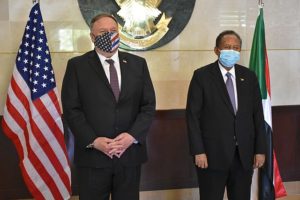Sudan’s Normalization With Israel Is a Win for Everyone

By U.S. Department of State from United States – Secretary Pompeo Meets with Sudanese Prime Minister Hamdok, Public Domain, https://commons.wikimedia.org/w/index.php?curid=93527729
Sudan announced last month that it had signed an agreement with the United States to initiate the process of normalizing relations with Israel. Despite fears of domestic pushback, normalization with the Jewish state is in the best interests of Sudan, Israel, and the world at large.
The deal was accompanied by a “memorandum of understanding,” which facilitates the US paying down the struggling country’s debt to the World Bank in an effort to kickstart Sudan’s economy.
As a result of the memorandum, Sudan now will be eligible to collect $1 billion annually from the World Bank for the first time in almost 30 years.
In the meantime, Sudan has agreed to place $335 million in escrow for American victims of terror attacks with ties to the African country, including the 1998 bombings of the US embassies in Kenya and Tanzania. In return, Washington has begun the process for removing Sudan from its list of state sponsors of terrorism.
Removal would be an economic boon for the Sudanese transitional government currently seeking to establish a democracy. Sudan’s presence on the list since 1993 has translated into severe economic sanctions and strict limitations on access to international credit.
Benefits for Israel
However, Sudan is not the only country set to gain.
Given normalization necessitates formal recognition of Israel, the transition from non-recognition to recognition is an unequivocal good for the Jewish state, whose adversaries have used the refusal of recognition as an international cudgel.
Closely tied to the practice of recognition is de facto respect for an individual state’s sovereignty and the decisions made by that state, something the Arab world typically had been reluctant to grant Israel. This is a very positive trend towards peace.
Benefits for Sudan
For Sudan, the benefits from normalizing ties with Israel are fairly straightforward.
On a fundamental level, the deal casts an economic lifeline to an economy crippled by COVID-19 and sanctions.
On a more abstract level, it allows Sudan to rehabilitate its image on the international stage. Sudan is not yet a democracy and remains a state in transition, but the simultaneous rejection of regional bad actors, like Iran, combined with genuine peacemaking efforts with Israel, would lend credence that its impending democratic transformation is genuine.
Sudan’s historical ties to terrorism against Westerners have led the nation to face prolonged diplomatic and economic ostracization. Normalization would allow Sudan to begin to legitimately conclude its fraught relations with Hamas and Iran once and for all, ridding itself of the legacy of Omar al-Bashir who transformed the nation into a “global center for militant jihadism.”
In short, normalization would signal an outright rejection of the idea that Israel must not be allowed to exist — and more importantly, that the Sudanese government desires it to exist.
Erosion of 1967 Three ‘Nos’
To its credit, Sudan cut ties with Iran in 2016 and removed its own despotic leader, al-Bashir, three years later. But normalization would place Sudan squarely in the rising isolate-Iran coalition, further distancing itself from forces that might lead to its return to the state-sponsors of terror list.
Fundamentally, normalization with Israel represents a continued erosion of the infamous 1967 three “Nos”—no peace with, no negotiations with, and no recognition of Israel – forged at the Arab League Summit, held in none other than Khartoum.
Sudanese normalization helps to tilt the regional status quo towards peace with Israel and further isolates the Iranian regime in the Middle East and the free world.
Increased Economic Opportunities
Finally, normalization with Israel would furnish increased economic opportunities to a country understandably eager to escape its economic crisis.
While Sudan offers Israel improved access to its Red Sea ports, as well as the possibility of increased cooperation on counterterrorism issues, Israel brings the possibility of new investment opportunities, financial assistance, and cutting-edge technology in critical sectors, such as agriculture and healthcare.
For a country seeking to transition to any form of lasting democracy and raising the lives, liberty, and happiness of its citizens, the imperative of rescuing the economy from freefall cannot be overstated.
Economic growth helps to secure the requisite level of stability needed to ensure the survival of the fledgling government and the citizens of Sudan.
Normalization represents a net positive, not only for Israel but for Sudan. The international community would be wise to celebrate these gains. There is still much follow-through needed, but the latest deal is both promising and long overdue.
Lieutenant General Jon Davis, USMC (ret.) is former Deputy Commandant Marine Corps Aviation and a Jewish Institute for National Security of America (JINSA) 2018 Generals and Admirals Program participant. Erielle Davidson is a Senior Policy Analyst at JINSA’s Gemunder Center for Defense and Strategy.
Originally published in The Global Post